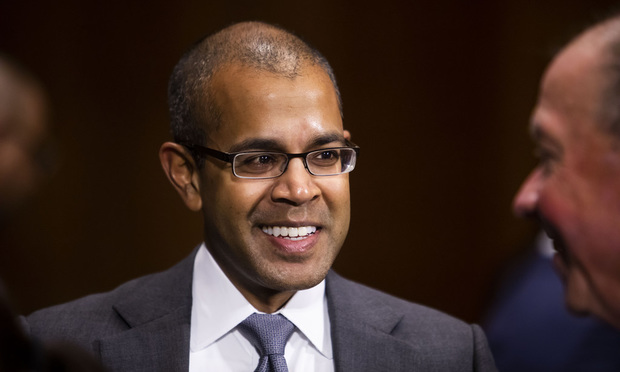In USS Cole Case, $315M Hinges on Justices Finding the Right Address
The justices struggled with an arcane issue that could force the Cole families—if they lose—to restart their long and difficult litigation under the Foreign Sovereign Immunities Act.
November 07, 2018 at 04:47 PM
5 minute read
The original version of this story was published on National Law Journal
 U.S. Supreme Court. Photo: Mike Scarcella / NLJ
U.S. Supreme Court. Photo: Mike Scarcella / NLJ
With nearly $315 million in damages at stake, the U.S. Supreme Court on Wednesday appeared divided over whether injured sailors and families of the 2000 USS Cole bombing gave proper notice of their lawsuit to the Republic of Sudan eight years ago.
The justices heard hourlong arguments in Republic of Sudan v. Harrison, stemming from a default judgment won by the Cole plaintiffs who claimed Sudan provided material support to al-Qaida and Osama bin Laden. The terrorist attack in Yemen killed 17 sailors and injured 39 others.
But during arguments, the justices struggled with an arcane issue that could force the Cole families—if they lose—to restart their long and difficult litigation under the Foreign Sovereign Immunities Act, or FSIA. Did they comply with the act by mailing notice of their complaint to Sudan's embassy in the United States? Or were they required by the act and international law to send it to the foreign affairs minister's address in Sudan?
Chief Justice John Roberts Jr. told White & Case partner Christopher Curran, representing Sudan, that his “first instinct” if he wanted to mail something to the head or cabinet member of a foreign country, would be delivering it to the embassy.
“I mean, the idea of mailing it to the foreign minister in some country and assuming it's going to get there in any reasonable time, I think you're much more—much more likely to reach them through the embassy,” Roberts said.
The key provision in the FSIA does not say to mail notice “at his own office,” Justice Elena Kagan told Curran. “And in the absence of that kind of language, there seems something special about the embassy situation. That's just everybody understands that embassies are supposed to be the point of contact if you want to do anything with respect to a foreign government.”
But Curran countered that embassies exist to serve diplomatic functions, “not to be a catch-all recipient for service of process or other things being sent to the foreign state.” He argued that the plain meaning of the service provision—that the mailing be dispatched to a specific person—requires that the mailing bear the address of that person.
“When Congress intended there to be an intermediary between the sender and the ultimate recipient, it said so,” said Curran, adding that Congress did so in another provision of the act, but not in the provision at issue in the high court.
Curran also argued that service on an embassy violates the Vienna Convention of Diplomatic Relations, which provides that the premises of the embassy or mission is “inviolable.” Curran received an argument boost from Assistant to the Solicitor General Erica Ross.
Williams & Connolly partner Kannon Shanmugam, representing the Cole families, told the justices that Sudan was trying to reverse a $300 million judgment based on “an unstated procedural requirement.” There is no requirement in the FSIA notice provision that the mailing be sent to the home country, he said.
 Kannon Shanmugam, with Williams & Connolly, chatting before the start of Allison Jones Rushing's confirmation hearing before the Senate Judiciary Committee to be U.S. circuit judge for the Fourth Circuit, on Oct. 17, 2018.
Kannon Shanmugam, with Williams & Connolly, chatting before the start of Allison Jones Rushing's confirmation hearing before the Senate Judiciary Committee to be U.S. circuit judge for the Fourth Circuit, on Oct. 17, 2018.Justice Sonia Sotomayor said the foreign minister is not physically at the embassy except for occasional visits. “It seems a natural understanding under most due process concerns that you serve the person where you're likely to find them,” she said.
The United States and 22 other countries do not accept service on their embassies, said Justice Stephen Breyer. “And to turn over to these countries, often very small, often without adequate legal advice, something that departs from a simple legal rule that everyone of them has followed in one form or another in the past is something that makes me nervous,” he said.
Shanmugam told Breyer there are steps a country can take: It does not have to accept service and can return the service packet immediately, and a country can object to any default judgment. He also said the justices could distinguish embassies from consulates and U.N. missions on the ground that embassies perform a unique function.
“The reason that we attempted service at the embassy was for the simple reason that, in 2004, Sudan was at the tail end of its Civil War and it was very hard even to find someone who would deliver a package to Khartoum with the requisite return receipt,” Shanmugam said. “And so this case really illustrates why this policy makes sense.”
“What would be the consequences in this particular case if you had to go back and if we were to rule against you and you succeed in achieving service [under another provision of FSIA]?” asked Justice Samuel Alito Jr. “Would Sudan appear?”
The case would have to start over, replied Shanmugam, and that would be particularly inequitable. The statute, he said, does not have the notice requirement sought by Sudan and Sudan had actual notice of the litigation. “We're talking about an objection that was raised at the very last minute in response to turnover orders. And that would be the height of unfairness to the Cole victims.”
Read more:
DC Circuit Vacancy Buzz Ramps Up After Kavanaugh's Elevation
SCOTUS Advocates Grumble at Proposed Rules to Shorten Filings
Williams & Connolly Partner, Up for 4th Circuit, Discloses $650K Income
This content has been archived. It is available through our partners, LexisNexis® and Bloomberg Law.
To view this content, please continue to their sites.
Not a Lexis Subscriber?
Subscribe Now
Not a Bloomberg Law Subscriber?
Subscribe Now
NOT FOR REPRINT
© 2025 ALM Global, LLC, All Rights Reserved. Request academic re-use from www.copyright.com. All other uses, submit a request to [email protected]. For more information visit Asset & Logo Licensing.
You Might Like
View All
Litigators of the Week: Feds Drop Charges Against Maryland Lawyer Facing Fraud Case Over $12M in Somali Funds

Latham Goes Global for Witness Testimony in Case for 'Fully Distributed' Freelance Platform Client

Litigators of the Week: Acquittals in the 'Espionage Lite' Trial of Tom Barrack and Protégé

Litigators of the Week: This Debevoise Duo Fended Off a $650M Arbitration Claim For the Republic of Iraq
Trending Stories
- 1Adding 'Credibility' to the Pitch: The Cross-Selling Work After Mergers, Office Openings
- 2Low-Speed Electric Scooters and PIP, Not Perfect Together
- 3Key Updates for Annual Reports on Form 10-K for Public Companies
- 4When Words Matter: Mastering Interpretation in Complex Disputes
- 5People in the News—Jan. 28, 2025—Buchanan Ingersoll, Kleinbard
Who Got The Work
J. Brugh Lower of Gibbons has entered an appearance for industrial equipment supplier Devco Corporation in a pending trademark infringement lawsuit. The suit, accusing the defendant of selling knock-off Graco products, was filed Dec. 18 in New Jersey District Court by Rivkin Radler on behalf of Graco Inc. and Graco Minnesota. The case, assigned to U.S. District Judge Zahid N. Quraishi, is 3:24-cv-11294, Graco Inc. et al v. Devco Corporation.
Who Got The Work
Rebecca Maller-Stein and Kent A. Yalowitz of Arnold & Porter Kaye Scholer have entered their appearances for Hanaco Venture Capital and its executives, Lior Prosor and David Frankel, in a pending securities lawsuit. The action, filed on Dec. 24 in New York Southern District Court by Zell, Aron & Co. on behalf of Goldeneye Advisors, accuses the defendants of negligently and fraudulently managing the plaintiff's $1 million investment. The case, assigned to U.S. District Judge Vernon S. Broderick, is 1:24-cv-09918, Goldeneye Advisors, LLC v. Hanaco Venture Capital, Ltd. et al.
Who Got The Work
Attorneys from A&O Shearman has stepped in as defense counsel for Toronto-Dominion Bank and other defendants in a pending securities class action. The suit, filed Dec. 11 in New York Southern District Court by Bleichmar Fonti & Auld, accuses the defendants of concealing the bank's 'pervasive' deficiencies in regards to its compliance with the Bank Secrecy Act and the quality of its anti-money laundering controls. The case, assigned to U.S. District Judge Arun Subramanian, is 1:24-cv-09445, Gonzalez v. The Toronto-Dominion Bank et al.
Who Got The Work
Crown Castle International, a Pennsylvania company providing shared communications infrastructure, has turned to Luke D. Wolf of Gordon Rees Scully Mansukhani to fend off a pending breach-of-contract lawsuit. The court action, filed Nov. 25 in Michigan Eastern District Court by Hooper Hathaway PC on behalf of The Town Residences LLC, accuses Crown Castle of failing to transfer approximately $30,000 in utility payments from T-Mobile in breach of a roof-top lease and assignment agreement. The case, assigned to U.S. District Judge Susan K. Declercq, is 2:24-cv-13131, The Town Residences LLC v. T-Mobile US, Inc. et al.
Who Got The Work
Wilfred P. Coronato and Daniel M. Schwartz of McCarter & English have stepped in as defense counsel to Electrolux Home Products Inc. in a pending product liability lawsuit. The court action, filed Nov. 26 in New York Eastern District Court by Poulos Lopiccolo PC and Nagel Rice LLP on behalf of David Stern, alleges that the defendant's refrigerators’ drawers and shelving repeatedly break and fall apart within months after purchase. The case, assigned to U.S. District Judge Joan M. Azrack, is 2:24-cv-08204, Stern v. Electrolux Home Products, Inc.
Featured Firms
Law Offices of Gary Martin Hays & Associates, P.C.
(470) 294-1674
Law Offices of Mark E. Salomone
(857) 444-6468
Smith & Hassler
(713) 739-1250






